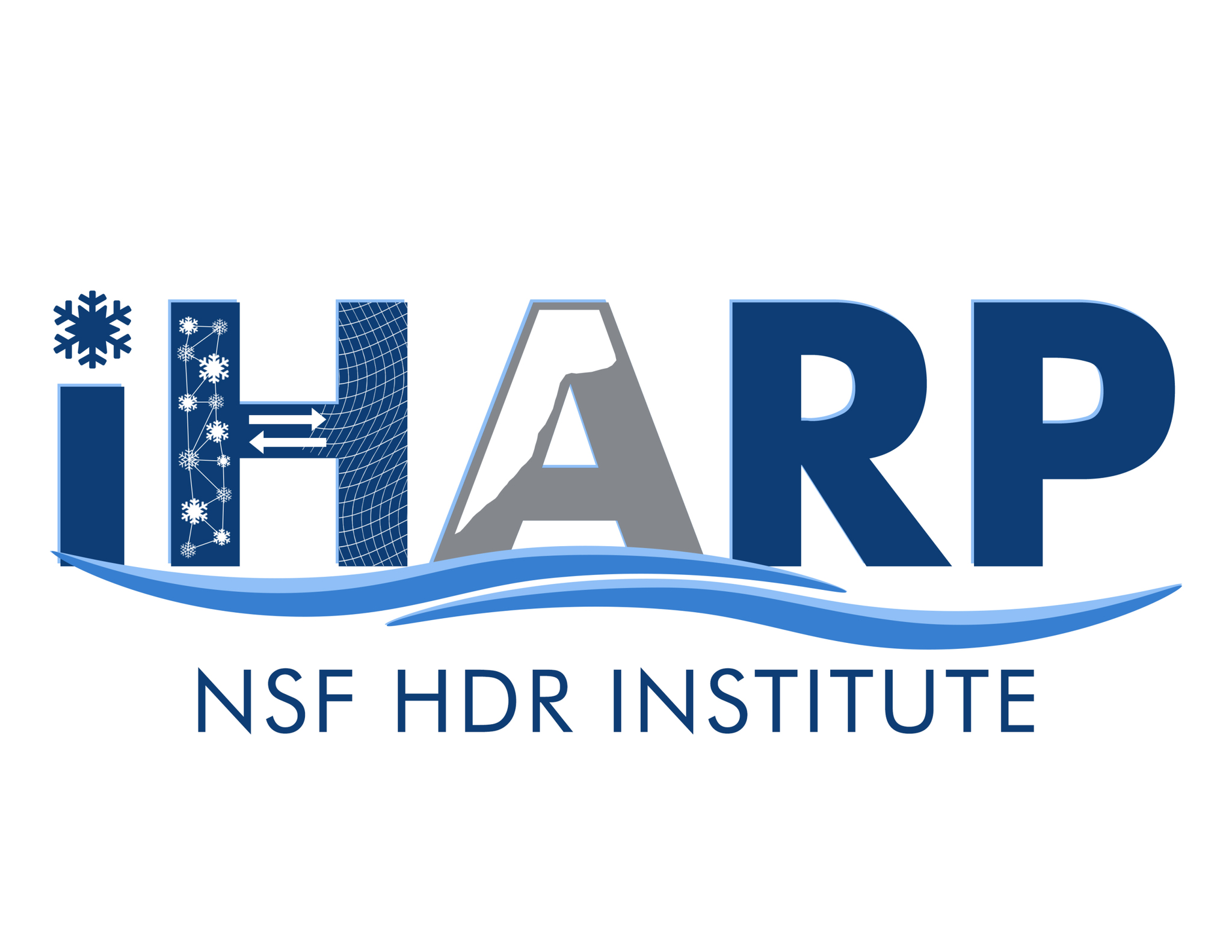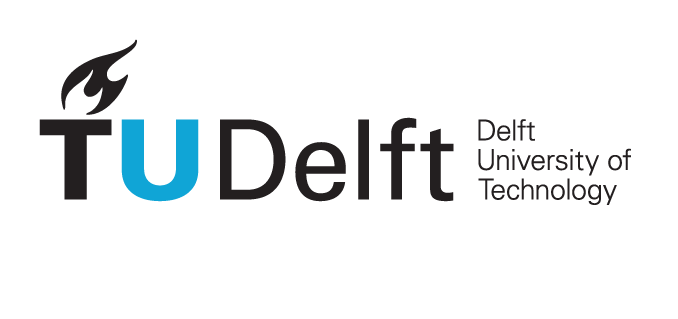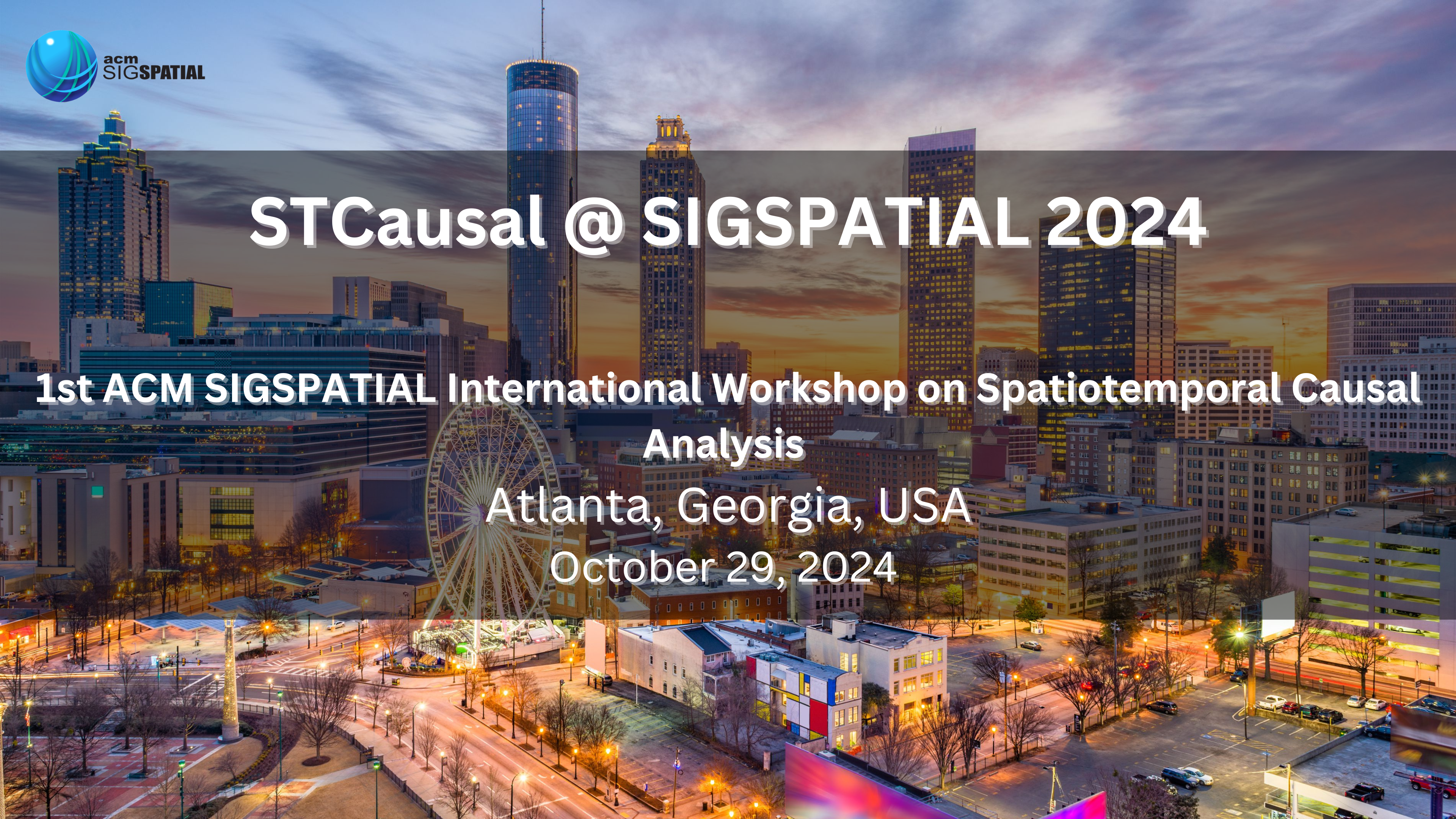1st ACM SIGSPATIAL International Workshop on Spatiotemporal Causal Analysis (STCausal Workshop 2024)
October 29th, 2024 in Atlanta, GA, USA
at the 32nd ACM SIGSPATIAL International Conference on Advances in Geographic Information Systems (ACM SIGSPATIAL 2024)
Description
Causal analysis, including causal discovery, causal inference and causal representation learning, is fundamental to understanding the behaviors of a natural and societal system, and therefore making proper decisions. Most traditional causal analysis has been built for I.I.D data. However, performing causal analysis in many scientific disciplines such as Earth science, epidemiology, transportation, urban planning, and economics, requires working on temporal, spatial, or spatiotemporal data. According to literature, there is still a lack of research in causal analysis of these types of datasets.
Our workshop will be an engaging mini-conference designed to explore the dynamic and intricate relationships between spatial and temporal data in understanding causality. This workshop will bring together experts, researchers, and practitioners from diverse fields to discuss cutting-edge methodologies, share innovative research, and foster collaborative discussions on the challenges and opportunities in spatiotemporal causal analysis.
Topics of interests:
- Causal discovery from temporal, spatial and spatiotemporal data.
- Causal inference from temporal, spatial and spatiotemporal data.
- Causal representation learning from temporal, spatial and spatiotemporal data.
- Deep/machine learning for causality.
- Causality for deep/machine learning.
- Spatiotemporal causal analysis applications in scientific disciplines (earth science, epidemiology, transportation, urban planning, etc).
- Spatiotemporal causal analysis applications in business and public sectors.
- Open-source tools, datasets and demonstrations for temporal, spatial and spatiotemporal causal analysis.
- Benchmarking across multiple spatiotemporal causal analysis algorithms & tools and/or across multiple spatiotemporal data.
Workshop Agenda
| Time | Agenda |
| 8:00 am – 8:10 am | Opening Remarks by Workshop Chairs |
| 8:10 am – 9:00 am | Tutorial Paper: Tutorial on Causal Inference with Spatiotemporal Data [slides] |
| 9:00 am – 9:25 am | Paper 1: Peculiarities of Counterfactual Point Process Generation [slides] |
| 9:25 am – 9:50 am | Paper 2: Rail transit delay forecasting with Causal Machine Learning [slides] |
| 9:50 am – 10:20 am | Break |
| 10:20 am – 11:00 am | Keynote Speaker 1 – Dr Georgia Papadogeorgou, Assistant Professor, Department of Statistics, University of Florida |
| 11:00 am – 12:00 pm | Keynote Speaker 2 – Dr Yao Xie, Coca-Cola Foundation Chair and Professor, H. Milton Stewart School of Industrial and Systems Engineering, Georgia Institute of Technology [slides] |
Venue:
Conference 7, Georgia Tech Hotel and Conference Center
Keynote Talks:
Keynote 1: Dr Georgia Papadogeorgou
“Spatial causal inference in the presence of unmeasured confounding and interference”
Abstract: This talk will present novel insights for causal inference in spatial data analysis, and establish how tools from spatial statistics can be used to draw causal inferences. We introduce spatial causal graphs to highlight that spatial confounding and interference can be entangled, in that investigating the presence of one can lead to wrongful conclusions in the presence of the other. Moreover, we show that spatial dependence in the exposure variable can render standard analyses invalid, which can lead to erroneous conclusions. To remedy these issues, we propose a Bayesian parametric approach based on tools commonly-used in spatial statistics. This approach simultaneously accounts for interference and mitigates bias resulting from local and neighborhood unmeasured spatial confounding. FromaBayesian perspective, we show that incorporating an exposure model is necessary, and we theoretically prove that all model parameters are identifiable, even in the presence of unmeasured confounding. To illustrate the approach’s effectiveness, we provide results from a simulation study and a case study involving the impact of sulfur dioxide emissions from power plants on cardiovascular mortality.
References:
- Papadogeorgou, Georgia, and Srijata Samanta. “Spatial causal inference in the presence of unmeasured confounding and interference.” arXiv preprint arXiv:2303.08218 (2023).
- Schnell, Patrick M., and Georgia Papadogeorgou. “Mitigating unobserved spatial confounding when estimating the effect of supermarket access on cardiovascular disease deaths.” (2020): 2069-2095.
- Reich, Brian J., et al. “A review of spatial causal inference methods for environmental and epidemiological applications.” International Statistical Review 89.3 (2021): 605-634.
Keynote 2: Dr Yao Xie
“Advancing Causal Discovery in Spatio-Temporal Systems: Methods and Applications”
Abstract: Causal discovery from spatio-temporal data is essential for identifying hidden relationships in complex systems, with applications ranging from power grid resilience to public safety and healthcare. In this keynote, I will share our recent work on applications such as causal graph discovery for ICU patient monitoring, mitigating disparities in power systems (energy justice), and analyzing police patrolling systems. We address key challenges, including computational complexity, limited data availability, and the heterogeneity of counterfactual effects, by developing methods that integrate statistical models, optimization techniques, and machine learning (including transfer learning). I will also discuss the broader challenges and opportunities in advancing causal discovery from spatio-temporal data, offering impactful tools to support data-driven decisions for scientists, doctors, policymakers, and industry leaders.
References:
Workshop Chairs
- Jianwu Wang, Professor of Data Science, Department of Information Systems, University of Maryland, Baltimore County, US
- Sahara Ali, Assistant Professor, Department of Information Science, University of North Texas, US
- Yanan Xin, Assistant Professor, Department of Transport and Planning, Delft University of Technology, NL
CALL FOR PAPERS
Important Dates
- Paper Submission:
September 1st, 2024September 8th, 2024 - Decision Notification: September 29th, 2024
- Camera-Ready Due Date: October 4th, 2024
- Workshop Date: October 29th, 2024
All submissions are due at 11:59 pm EDT.
Paper Submission
The workshop seeks high-quality full (8-10 pages) and short (4 pages) papers that have not been published in other academic outlets and are not concurrently under peer review.
Manuscripts should be submitted in PDF format and formatted using the ACM camera-ready templates available at http://www.acm.org/publications/proceedings-template. SIGSPATIAL uses the Conference Proceedings Primary Article template with two-column format. Alterations to the template, especially to gain more space, will be grounds for administrative rejection without further technical review. The author list is considered to be final after the submission deadline and no changes to the author list are allowed for accepted papers.
Submission link: https://easychair.org/conferences/?conf=stcausal2024
Accepted papers will be published in the ACM Digital Library. At least one author of each accepted paper is required to attend the workshop and present the paper.
Program Committee
- Kevin Credit (Maynooth University, IE)
- Totte Harinen (Airbnb – San Francisco, US)
- Urmi Ninad (TU Berlin, DE)
- Katerina Schindlerova (Universität Wien, AT)
- Jonas Wahl (TU Berlin, DE)
- Levi John Wolf (University of Bristol, GB)
- Shu Yang (North Carolina State University – Raleigh, US)
- Cécile de Bézenac (Alan Turing Institute – London, GB & University of Leeds, GB)
Workshop Sponsors


Conference Sponsors





